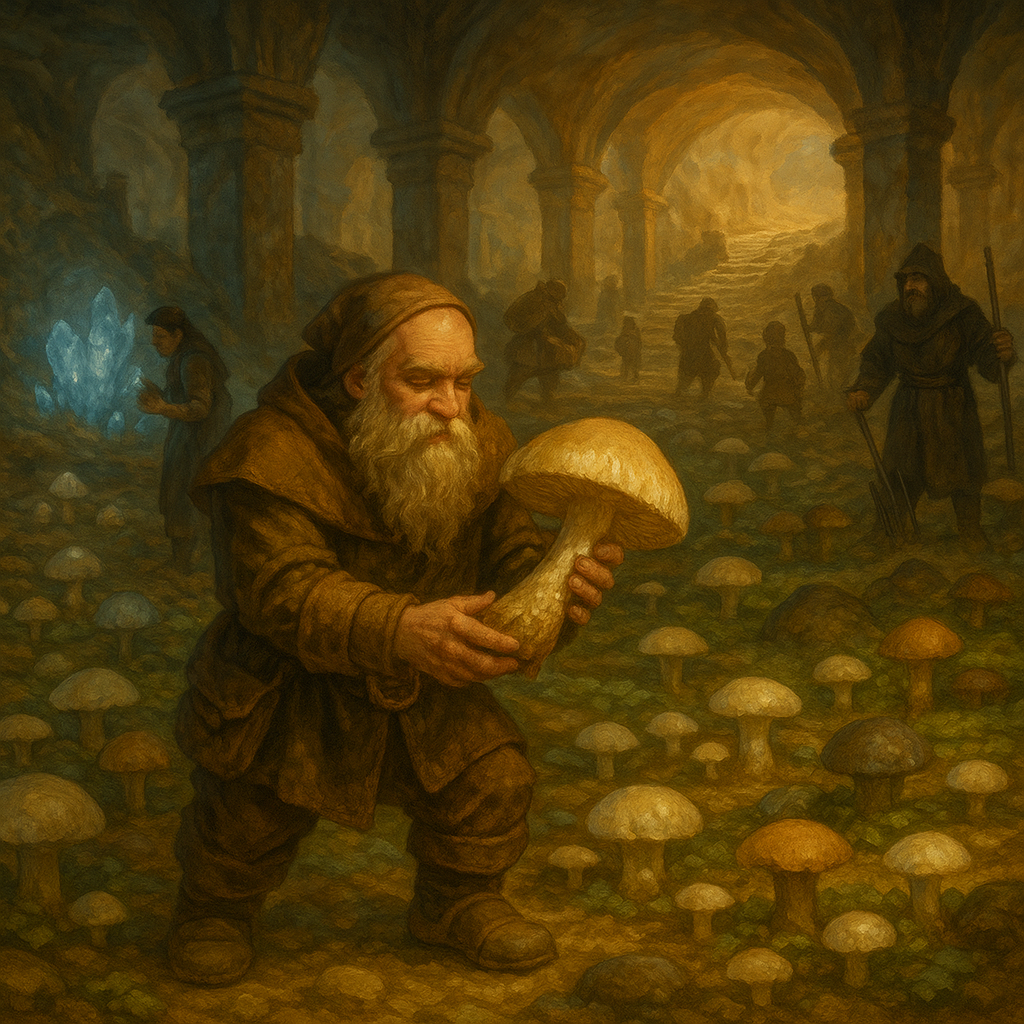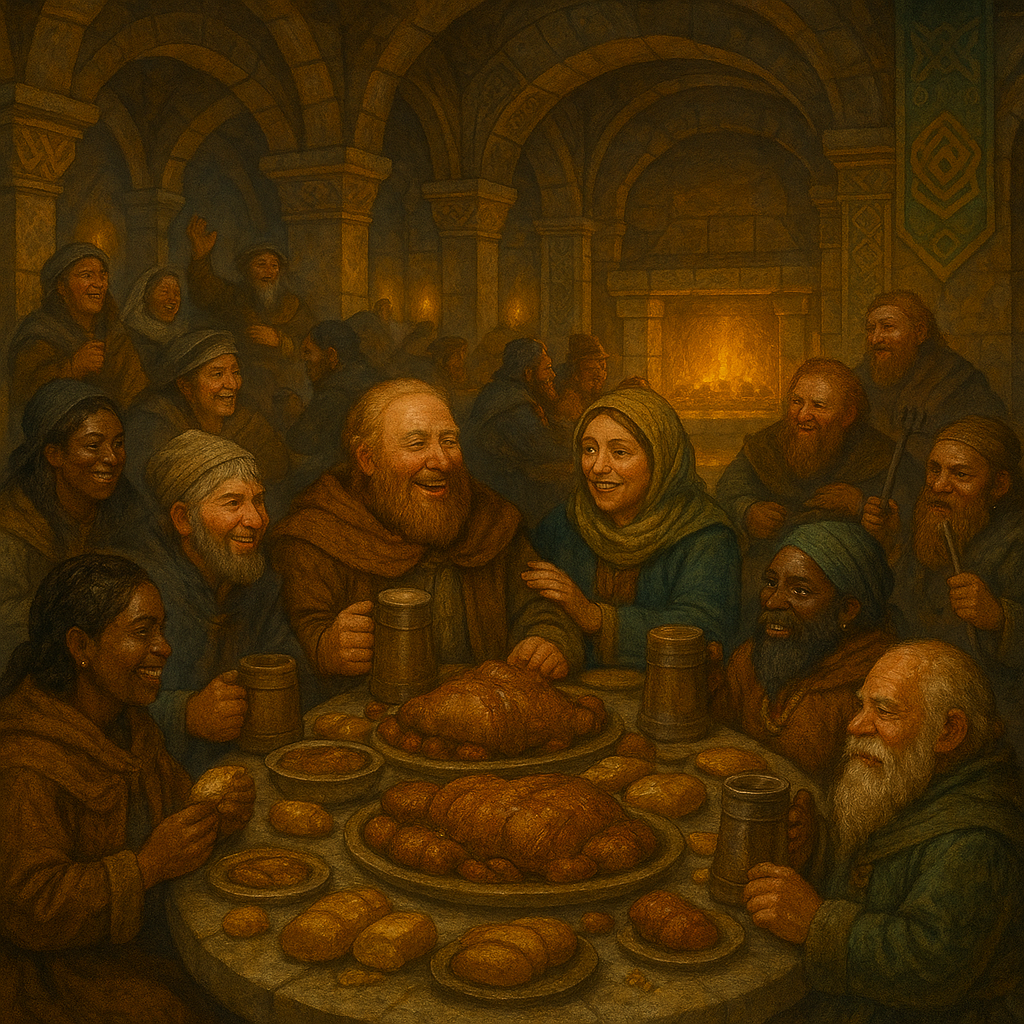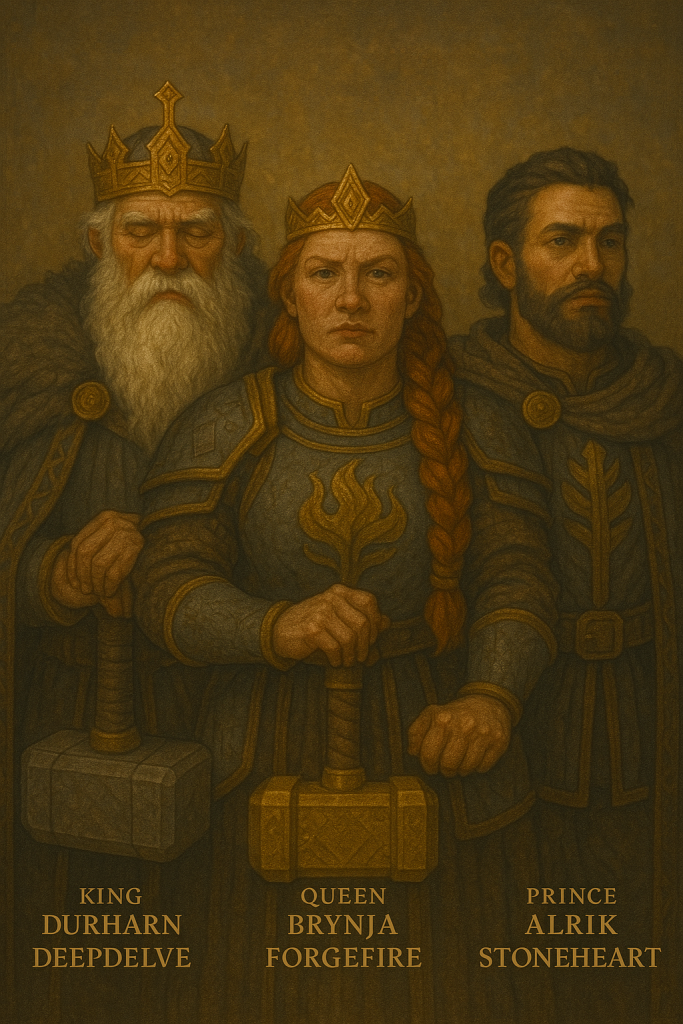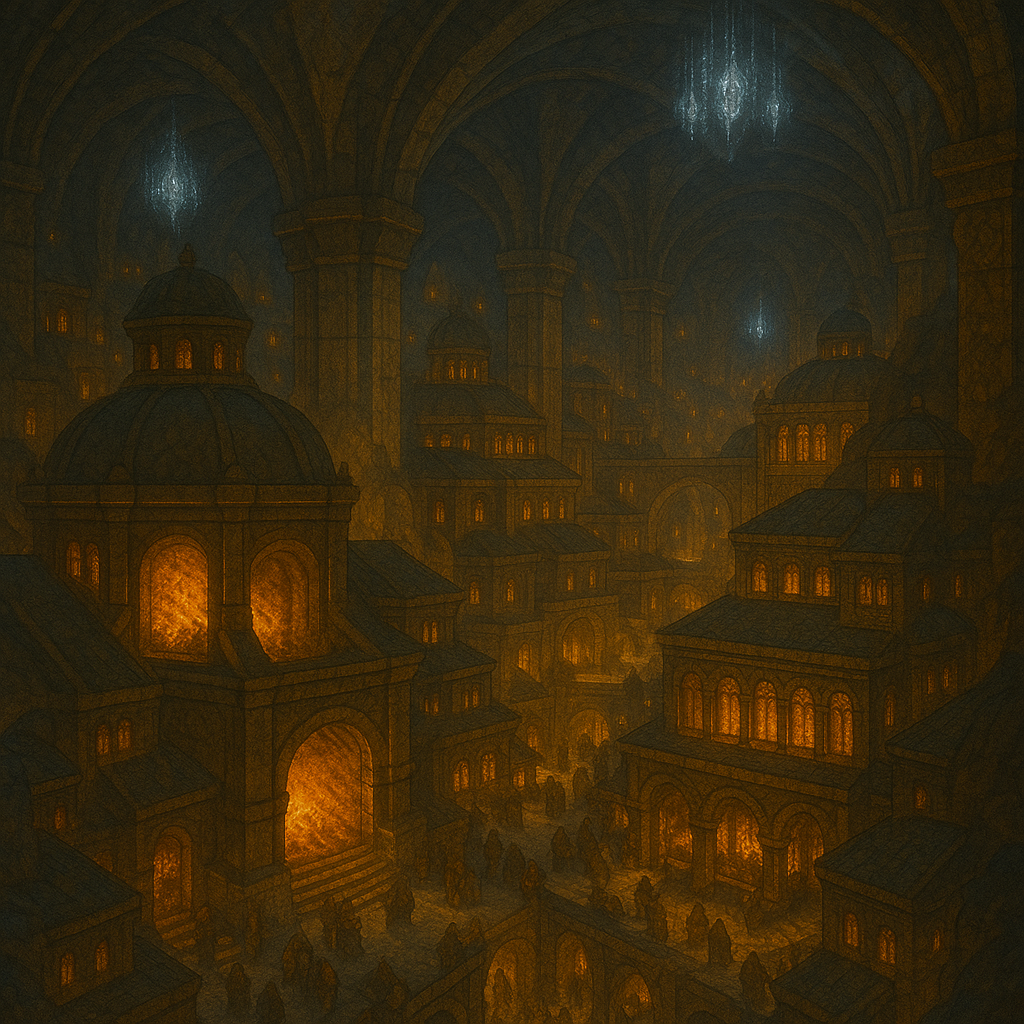Hardy and proud, the dwarves carve their legacy deep into the bones of the world. Their mountain halls echo with songs of stone, fire, and family. A tripartite rule of king, council, and clergy holds the realm together through duty and reverence for earth and craftsmanship. Dwarves are expert blacksmiths, brewers, and warriors, and their loyalty is as unyielding as the stone they shape. While the surface changes with time, the dwarves endure, steadfast as ever—and always watching the young races with cautious eyes.
Attribute Bonus
Dwarves receive +1 Athleticism point bonus at level one.
Language
Known to scholars as Stone Tongue, the dwarvish language is as enduring and unyielding as the mountains themselves. Forged in the halls of Deepthrone and echoed through mine tunnels and feasting halls alike, it is a tongue of weight and resonance, shaped by generations who carved their truths into stone and sung their history into anvils.
Stone Tongue is a guttural, hearty blend of Germanic strength and Nordic rhythm, full of deep vowels, forceful consonants, and a cadence that rolls like a mountain drumbeat. It is not a soft language, but it is not harsh either—it is proud, percussive, and grounded. To the dwarves, every word carries the weight of legacy, and to speak is to build something enduring.
Compound words are commonplace, often stacking meaning like bricks in a wall. Proverbs and sayings are prized, especially those that hold layers of wisdom in few syllables—a reflection of dwarven values: clarity, craftsmanship, and concise truth. A dwarven blessing might sound like a warcry; a dwarven insult like a thunderclap. And when a dwarf shouts in joy, as they often do, the whole mountain may echo with laughter.
Stone Tongue is not merely spoken. It is etched, engraved, and sung, woven into banners, blades, and brews. It is the sound of iron striking iron, of laughter in a mead hall, and of oaths sworn so deeply they could shake the world.
To speak Stone Tongue is to speak with the mountain’s voice.
Example Phrases
“Stein hält, Herz brennt.”
Translation: “Stone holds, heart burns.”
Context: A common dwarven proverb. It means that while dwarves are outwardly stoic (stone), they feel deeply and fiercely (burning heart). Often used to express loyalty, love, or hidden passion.
“Bier vor Blut.”
Translation: “Beer before blood.”
Context: A humorous but serious expression meaning “resolve things over a drink, not a blade.” Commonly heard in taverns to defuse tension or at the start of peace talks.
“Kein Werk stirbt im Namen.”
Translation: “No work dies in its name.”
Context: Said when dedicating a crafted item, building, or song. It means the name of the thing keeps its spirit alive, especially when the creator has passed.
“Wenn du schreist, lebst du.”
Translation: “If you’re shouting, you’re alive.”
Context: A battle cry and expression of dwarven vitality. Used both in combat and celebration, reinforcing the dwarven joy in life’s intensity.
“Wort wie Stein. Nicht leicht, nicht leer.”
Translation: “A word is like stone. Not light, not hollow.”
Context: A reminder to speak with intention. Among dwarves, lying is rare—but saying something thoughtless can be just as damaging.
Names
In the Mountain Kingdom, a name is not merely a label—it is a monument. Every dwarf bears a Given Name, short and strong like a hammer strike, followed by a Family Name that grows with the weight of generations.
Given Names
Dwarven given names are typically one or two syllables, chosen for clarity and strength. They are spoken like oaths and remembered like songs:
Borin. Kelda. Durik. Thrain.
Family Names
A dwarf’s family name is a living record of lineage and legacy, deeds and honor. With each generation, the name expands—honoring ancestors, great accomplishments, and defining traits. To speak one’s full name is to call upon the memory of every soul who shaped it.
Family names are often compound words, built from Dwarvish root terms and titles bestowed in life or death:
Stonemaul – for one who shattered enemy lines in battle
Ironfoot – for a trek across frozen wastes without rest
Hearthbinder – for one who reunited a fractured clan
Goldfinder – for the prospector who struck the Deep Vein
Thunderhand – for the smith whose work echoed through the mountains
“Borin Stonemaul Ironfoot Hearthbinder, son of Garn Hearthbinder, son of Ulrik Ironfoot, son of Bruni Stonemaul.”
This full recitation is not mere pride—it is identity, a chain of stone-bound memory linking the speaker to all who came before. To forget or shorten it is rare; to forfeit a name is to sever oneself from clan and craft entirely
Tone and Sound
Dwarven names are consonant-heavy, with deep vowels and a steady, grounded cadence. They are meant to be spoken with weight—whether sung in feasting halls, shouted across battlefields, or etched into stone.
To know a dwarf’s full name is to know their story. And every name is still being carved.
Economy
To understand dwarven trade is to understand the soul of the mountains themselves—patient, enduring, and layered with meaning.
Beneath the snow-capped peaks of the Mountain Kingdom, life thrives underground. The dwarves cultivate vast gardens of edible fungi, mosses, and root vegetables, their underground fields lit by glowing crystal blooms and tended with the same care given to children. In the high passes, goats, sheep, are tended by patient shepherds, and wildcats are hunted with reverence, their hides and meat sustaining both feast and forge.
But it is not in meat or mushrooms that the dwarves earn their renown—it is in stone, metal, and fire.

Craft as Communion
Every hammer strike, every chisel mark is more than labor—it is a spiritual act. Dwarves believe the earth holds ancient wisdom, and that through their craft they commune with the spirit of stone itself. A blacksmith does not simply shape iron; they speak to it, listen, and guide it toward its true form. This reverence infuses every creation with soul.
Their exports are among the most coveted in all Tambra:
Gemwork and jewelry, each piece a testament to precision and patience
Weapons and armor renowned for their strength, balance, and the lore etched into every surface
Rare ores and stones, drawn from veins known only to their oldest maps and deepest dreams
These goods are treasures in every kingdom, passed down as heirlooms, carried as dowries, and offered as tribute to kings and gods alike.
Currency and Trade Philosophy
Dwarves favor gems and precious metals—not only for their value, but for their permanence. A gem can be held, studied, and passed on. A coin is a whisper; a gemstone is a song.
Yet even more than wealth, dwarves prize relationships. They believe in building trade alliances that span generations, not bartering over single sales. To sell a blade is one thing—to forge bonds of trust with another people is far more enduring.
The Feast Before the Deal
No true dwarven trade begins with a handshake. It begins with a feast.
“You do not trade with a stranger,” the dwarves say, “You trade with kin of the heart, even if only for a day.”
Before any significant negotiation, hosts and guests sit together in warm halls filled with thick bread, roasted meat, earthy stews, dark ale, and louder songs. Stories are shared. Names are remembered. Only when bellies are full and laughter echoes off the stone does talk of business begin.
The more lavish the meal, the more generous the spirit, and the better the terms that follow.

Weapons, Armor, and Legacy
Dwarves craft with refined iron, drawn from deep within the mountains and alloyed with rare minerals known only to their kind. Their weapons—broad axes, warhammers, spears, and rune-etched blades—are functional works of art. Their armor—heavy plates, chainmail, and helms marked with ancestral glyphs—blends protection with pride.
A dwarven warrior does not simply wield a weapon. They bond with it.
To inherit a blade is to carry the soul of its previous bearer—and with it, their story.
The dwarven economy is not built on gold or greed.
It is built on trust, tradition, and the unshakable belief that what is forged with care, and traded with honor, can last forever.
Government
Deep within the mountain halls of Tambra, dwarven society stands upon a foundation as solid and complex as the stone it was carved from. Their system of governance is one of balance, reverence, and deeply layered tradition, forged over generations and guarded with the same intensity as any ancestral vault.
A Triad of Power
The dwarves are ruled not by a single hand, but by a tripartite system of authority—a sturdy triangle where no corner holds unchecked power:
The King — The living symbol of dwarven unity and endurance. He holds final authority and is seen as the chosen vessel of Stone and Earth, a spiritual bond as much as a political one.
The Council of Halls — A collection of nobles, each representing a major dwarven settlement. The Council oversees laws, trade, and defense, and serves as the kingdom’s legislative heart.
The Stonecloaks — A powerful religious order devoted to Earth and Flame. The Stonecloaks provide spiritual guidance and moral oversight, offering either blessing or rebuke to royal decrees.
The Council may draft laws, and the Stonecloaks may preach support or condemnation—but in the end, only the King may decree. It is a system of sacred checks and political balances, forged to reflect both the weight of tradition and the heat of conviction.
King Durharn Deepdelve — The Sleeping Hammer
At the center of this structure sits King Durharn Deepdelve, an ancient dwarf whose name once echoed through feast halls and forge chambers alike. In his youth, Durharn was a giant among dwarves: a tireless digger, a master craftsman, and a roaring presence whose hammer shook the mountainside. But time, even for dwarves, carves away all things.
Now Durharn is withdrawn—his hammer quiet, his appetite faded, his council seat more often warmed by memory than presence. Some say he listens to the deeper earth now, communing with things older than politics. Others say he’s simply grown weary.
Around him, the mountain stirs.

Queen Brynja Forgefire — The Iron Flame
If the King is the stone, Queen Brynja is the fire that keeps it warm. Younger by decades but older in spirit, Brynja is no passive consort. She is fierce, loyal, and unrelenting in her defense of her husband’s reign. In the Council chambers, she wields a ceremonial hammer—though few mistake it for merely symbolic.
With wit as sharp as any axe and the will to back it, she has become the true voice of the throne, fending off whispers of abdication with word and weapon alike.
Prince Alrik Stoneheart — The Heir in Waiting
Beloved by the younger clans and respected by the old, Prince Alrik Stoneheart walks a narrow bridge. Wise beyond his years and charismatic in a way his father never was, Alrik understands both the burdens of legacy and the urgency of change. But he is torn—bound by loyalty to his father, and haunted by the question every hall is asking in quiet tones:
How long can a hammer hang on the wall before someone else picks it up?
Key Locations
Cradle of Stone — The Capital of the Deep
Nestled within the massive heart of Stonefather’s Crown, the highest and oldest mountain in Tambra, lies the dwarven capital: Cradle of Stone. Hewn entirely from the living rock, this subterranean marvel gleams with the fire of a thousand forges and the glow of enchanted crystal chandeliers.
Grand feasting halls echo with song and story. Breweries bubble with ales as old as kingdoms. Forgecathedrals ring with the chants of smith-priests who believe every hammer strike honors the spirit of the Earth.
The city is also a fortress, layered with collapsing tunnels, oil traps, and hidden gates. No force has ever breached it, and few ever try. Every dwarf dreams of making a pilgrimage here, for the Cradle of Stone is the cultural soul of their people.

The Flameborn Conspiracy
Deep within the stone-halls of the faith, High Cleric Brodin Flameborn plots a quiet rebellion. As head of the Stonecloaks, he outwardly preaches tradition and devotion — but secretly believes that the throne belongs not to kings, but to the clergy.
He spreads whispers of a divine “cleansing,” when the true children of stone will rise, unshackled from mortal rule. Loyalists stir among the lower nobility and temple ranks, and Brodin works relentlessly to undermine the King’s authority, one flickering prayer at a time.
Stonefield Vale — The Kingdom’s Breadbasket
At the foot of Stonefather’s Crown lies Stonefield Vale, a fertile valley of root farms, barley fields, and livestock pastures. Though less militarized than the mountain cities, Stonefield is essential — its people feed the kingdom, and its brewmasters supply its soul.
Elder Marnic Hearthbranch, Warden of the Fields
A calm, patient steward, Marnic is respected more than feared. His wisdom runs deep as the roots he tends, and though some noble houses dismiss him as “just a farmer,” his voice in the Council of Halls carries the quiet strength of the common folk.
His daughters — Branya (a healer), Kira (a council negotiator), and Mira (a budding earth-mage) — form a trio of influence shaping both Stonefield’s present and the kingdom’s future.
Deepvault — The Shadowed Mines
Far from the crown, in the blackest reaches of the western range, lies Deepvault, a mining stronghold of uneasy reputation. The dwarves here live without sun, navigating by crystal gardens that glow with ghostly light. Their weapons are different. Their prayers are different. So too, perhaps, are their loyalties.
Lord Kaedric Blackdelve, Protector of the Deep
Outwardly, Kaedric is the ruler of Deepvault — proud, loud, and steadfast in his duty. But beneath the surface, he is a pawn in a deeper game.
Velgra Duskworn, The Silent Matron
Velgra is the true power of Deepvault — a master manipulator who has embraced darkness not as corruption, but as evolution. Through secret cults, dark-forged weapons, and whispered prophecies, she prepares for a future where Deepvault no longer answers to Cradle of Stone — or any surface power.
Other Landmarks and Settlements
Holdfast Bridge – A mighty, fortified span over the Stonevein River, controlling all trade between the mountains and the plains. Its garrison lives by the motto: “No gold flows without Holdfast’s gaze.”
Veinwatch Bastion – A cliff-city that guards the ancient source of the Stonevein and protects hidden waterworks and mineral veins critical to dwarven metallurgy.
Gravenshield Hollow – A quiet hamlet nestled in a gorge of waterfalls and luminous crystal. Its Shimmerdeep Vein is rumored to enhance forging rituals if used at midnight.
Current Tensions and Story Hooks
The Crown in Crisis — Will King Durharn step down? Will Alrik rise? Or will Brodin seize the throne in all but name?
Deepvault’s Darkness — Strange metals and ominous symbols emerge in trade. Queen Brynja seeks someone to investigate.
Stonefield’s Struggle — Should the farmers of the Vale hold equal power to the iron-casters of the capital?
The Mountain Kingdom may seem still and solid, but beneath the surface, the earth stirs. The deeper you go, the more you’ll find—truth, treachery, or something far older than both.
Affinities
Among all the peoples of Tambra, none revere the Primal Forces with more solemnity and structure than the dwarves. For them, Affinities are not just powers — they are echoes of the World-Forge, the mythical act of shaping reality through purpose, patience, and will. A dwarf does not take to magic lightly, and when one does, it is with discipline, tradition, and ritual precision.
The Chant of Stone and Spark
As sung by the Stonecloaks of Cradle Deep
Before the forge, before the flame,
The world was dark, and none had name.
No chisel carved, no hammer rang,
Just stone in sleep, and silence sang.
Then Light struck deep, a molten cry—
It split the dark and seared the sky.
The Earth awoke with grumbling breath,
And broke her bones to birth from death.
Fire roared first from under stone,
A heart of flame, yet not alone.
The Wind blew wild through mountain teeth,
While Water danced in caverns beneath.
The fourfold beat became the base,
For stone to hold and life to trace.
And so we came—of grit and flame,
Not gods, but sparks that dared to name.
We shaped the world with iron will,
And sang to stone that answers still.
Truth rang clear, like anvils call—
But Trickery crept through shadow’s hall.
So guard your oath and hold it tight,
For stone remembers wrong and right.
Earth — The Soul of the Stonefolk
Earth is the beating heart of dwarven identity. It is strength, stability, memory, and permanence — all things that define dwarven culture. Those born with an Earth Affinity are said to have “stone in the blood” and are often chosen as stonemasons, builders, wardens of heritage, or even judges.
Their magic is slow but unbreakable — raising walls, shaping stone, and binding the ground beneath their feet to their will. Earth-Affinites are often entrusted with protecting ancient sites and vaults that should never fall.
“Stone remembers. So do we.”
Fire — The Flame in the Forge
To the dwarves, Fire is not destruction — it is transformation. It is the forge, the feast, the first warmth after a long dig. Dwarves with Fire Affinity are often smiths, battle-priests, or brewmasters, using their inner flame to melt, mold, and renew.
These dwarves are both feared and revered, their passions burning deep beneath layers of stoic resolve. Their power is channeled through ceremonial hammers, anvil-rites, and sacred flame dances, not wild bursts or reckless fury.
“Fire refines. Fire reveals.”
Truth — The Sacred Measure
Truth is holy among the dwarves. It is their compass, their code, their highest virtue. Affinity for Truth is rare but deeply respected. These dwarves are natural lawspeakers, oath-keepers, and keepers of lore. They cannot lie, and their presence often burns through deceit like flame through parchment.
Truth-Affinites are often chosen as mediators in council disputes or spiritual judges in matters of clan honor. It is said that no dwarf with the Affinity of Truth has ever broken a sworn vow—for to do so would be to shatter their soul.
“Words, like stone, must hold weight. If they do not, they crumble.”
Trickery — The Unforgivable Affinity
Among the dwarves, Trickery is not a game — it is a stain.
Deception is seen as a breach of kinship, a crack in the stonework of society. Dwarves born with an Affinity for Trickery are feared, distrusted, and often exiled unless they turn their talents toward sanctioned roles—spies, scouts, or agents on behalf of the kingdom. Even then, they walk a fine edge.
To hide one’s nature is one thing; to twist it is another. In dwarven society, Trickery is not simply frowned upon — it is a sign that the soul has been warped by shadow.
“What is hollow will one day collapse.”
Cultural Note
While other affinities exist—Life, Death, Water, Air, Nature—the dwarves see them as useful but not foundational. Those born with such powers may still serve the kingdom, but their gifts are treated with pragmatism, not reverence.
For dwarves, what matters is not the fire you wield, but whether you honor its purpose. Whether your stone is stable. Whether your word holds.